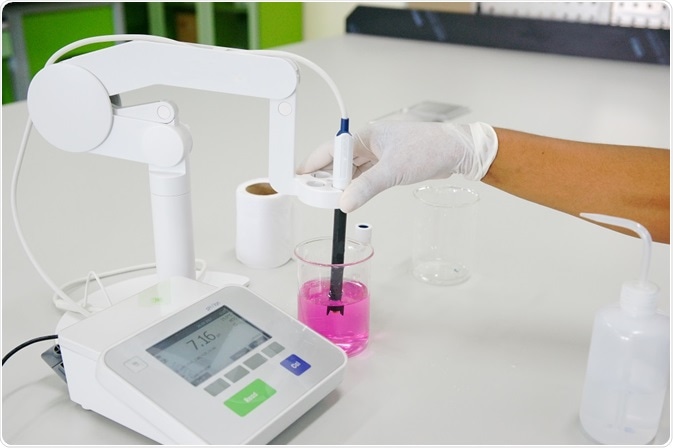pH meters are an essential part of many laboratories. pH can affect microbial growth and chemical reactions, pH meters must be calibrated regularly.
 Image Credit: Choksawatdikorn / Shutterstock
Image Credit: Choksawatdikorn / Shutterstock
pH meters consist of either distinct reference and pH electrodes, or (more commonly) a single combination electrode. These devices are dipped in liquid and the difference between the potential of the two electrodes is used to determine the overall pH of the solution. However, there are several factors related to the pH meter or the buffer solution it is placed in can affect the accuracy of this measurement.
Glass membrane
The pH electrode is usually made of glass. Coatings on the glass surface can alter the pH readings significantly. Coatings of different substances, including pollutants, solids, biofilms, poorly soluble deposits, lime, or oils can make the glass surface inaccessible to the measured medium. Thus, the glass surface should be cleaned regularly.
However, this should not be done ‘mechanically’ as forceful cleaning can damage the surface of the glass. This should be done ‘chemically’ suing dilute acids, tenside-containing cleaning solutions, or thiourea solution.
Diaphragms
The pH electrode contains a diaphragm, consisting of a porous ceramic, Teflon ring, and a small hole. This functions to prevent the leaching of electrolytes, however, blockage by soluble compounds can lead to increased resistance and low pH. Using cartridge reference system can prevent this problem.
Reference electrolyte and reference electrode
Presence of electrode poisons in the measurement medium can corrode the silver/silver-chloride reference electrode and lead to change in the potential difference. This can be prevented by using a two-chamber electrode and which reduces the access of the electrolyte to the reference electrode.
Measurement medium
The medium in the pH meter can also raise problems. Use of deionized, distilled, demineralized water can increase the electrical resistance in the measurement medium, which can alter the pH measurements. However, releasing large amounts of potassium chloride into the solution through solid potassium chloride in the electrode can resolve this issue.
Contacts
The electrodes are usually connected using cables. Different cables are manufactured by different manufacturers and thus, incompatibility may arise between different pH meters of different manufacturers. An O-ring can be used in the connection between the electrode and cable to prevent the entry of moisture.
pH connection cable
The pH meter and all its electrical connections should have high insulation resistance as short circuits can cause errors in the pH reading and damage the instrument. Thus, only coaxial cables are used in pH meters and the connecting cables have a semiconducting layer apart from the copper shielding.
Effect of temperature
Temperature is an important factor while measuring pH. This is because the chemical reactions and pH values are temperature-dependent. Also, the voltage signal measured in a pH meter is also temperature dependent. In conditions where temperature is variable, it is advised to add a temperature sensor in the pH meter. The sensor measures the pH based on the temperature corrected slope.
Effect of moisture and pressure
Extreme pressures and changes in pressure can damage the glass material of the reference. Selecting special electrodes and fitting the glass membrane with special fittings can help evaluate this issue. Also, drying out due to lack of moisture can also affect the glass membrane.
Mechanical disruptions
Presence of particles in the medium can lead to abrasions on the glass surface of the pH electrode. This can reduce its life and alter the readings. Special or flat surfaces of glass membranes have been designed to reduce the impact of this problem. Also, vibrations and shocks leading to stress on the materials can also reduce its life. Changes in the installation location can solve this issue.
Electrical disruptions
Electrical faults or short circuit can lead to loss of slope or signal in the pH meter. All electrical aspects, including grounding, shielding, installation, and cables should be cross checked during and after installation.
Further Reading
Last Updated: Feb 26, 2019